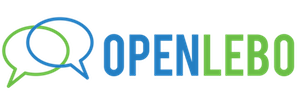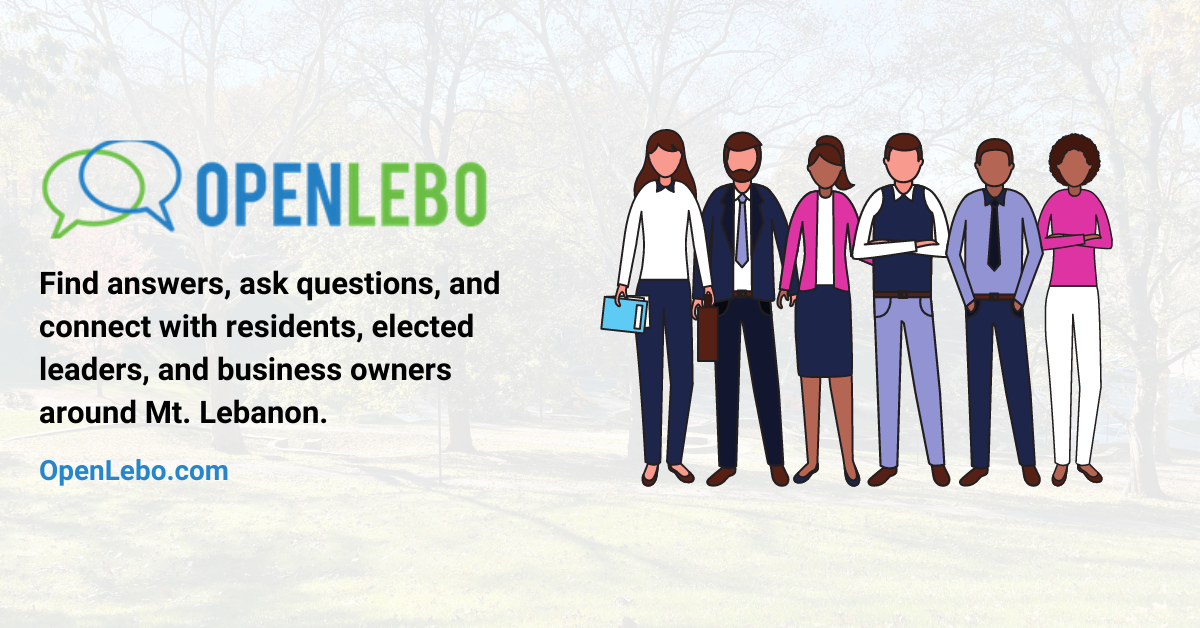What follows below is the short story behind why OpenLebo.com is needed, how it got started, and how you can participate.
Who Is Behind OpenLebo.com?
This site was started by Craig Grella, a resident and, at the time this site was created, elected Commissioner in Mt. Lebanon’s 4th Ward. What is important to understand is that this site has no official affiliation with the Mt Lebanon Municipality or Mt Lebanon School District. My views, comments, and other content posted here are solely my views and do not reflect the opinions or official workings of the School District or Municipality in any way. Other elected officials may, from time to time, post on this site as well, and when they do that content will be their sole opinion and not the opinion of the bodies they were elected to represent. I’ll explain more on this in just a minute, in the meantime — if you want an official opinion or comment from the municipality or school district on any topic I recommend you visit those official channels:
Why OpenLebo.com?
The idea for a site like Open Lebo first came to me in 2019, a little over a year after being elected as Commissioner. There are so many important issues to discuss, and most of them require more than a cursory review — they require deep thought, review from all angles, input from all stakeholders, and comment from fresh eyes. I quickly learned that there was just not enough time to dive into all the important issues facing our community during two commission meetings each month or the discussion sessions that preceded them. With families, sports, dinner time, and the timing of the official meetings — very few residents could take time out of their busy schedules to attend. So more goes unsaid, unnoticed, and unexplained until something blows up (figuratively speaking).
I started to think there must be a better way to continue these conversations outside of official channels — to give people the information they needed, in an informal way that didn’t require deliberation or break the rules of public governance.
There are a few community groups that popped up on Facebook and other social networks where residents could get together and post interesting stories. But like most networks, those are chronological walls and topics get quickly buried under newer posts. Networks like Facebook are notoriously hard to search, and others, like Twitter, while searchable, quickly lose context when taken out of the chronological order they were designed to encourage. Networks like that also suffer from the same question being asked over and over again – it’s what makes group moderators burn out and leave because on those networks comments and posts can’t be merged into similar topics. They just run again. Get buried. Get asked again. Get buried. Asked again. Buried. It’s a never-ending silly game that the network creators don’t care to solve.
The fact is, those networks just weren’t built for community conversations. Not to mention they mercilessly track you across the web, sell your data to the highest bidder, and are used mainly now to spread hate and division. In fact, their business models depend on it. See Facebook Whistleblower Frances Haugen’s Senate testimony and the award-winning documentary The Social Dilemma for more on that assertion. It was clear to me that Facebook and most of the other social networks are not the answer.
Other team tools like Slack and Discord also don’t work. They lack the sophistication to properly organize community conversations — they too are merely chronological posting walls that focus only on the here and now.
I knew that we needed a better way, and probably a better format, to have broad-based community conversations but couldn’t find a tool that would allow me to do it the way I thought it should be done.
I started to have conversations with other commissioners and school board directors who felt the same way — that there was just never enough time to dig into all the things we needed to discuss. We started to create a framework for a website that would allow members of the public to have the best of what the social networks offer, but also allow for organization required for real community building. I knew we needed the ability to:
- Post quick status updates so that friends and family can follow you and stay up to date; as you can on Twitter, Reddit, or Facebook.
- Post questions and get quick answers from the community; like you can on pretty much every social network.
- Post images, gifs, videos, links, and other media; like Instagram, and also because they’re awesome.
- Create longer-form articles; as you’d see on news sites and popular blogs.
- Create and join social groups; like on Facebook, Google, and MeetUp.
- Send private messages to community members or group messages to an entire group.
- Make public only the info we wanted public and keep private the info we want to keep private.
- Prevent our data from being sold to third-parties and advertisers across the world.
In early 2020, I created the first version of OpenLebo.com and ran it by the Municipal solicitor to make sure it was providing enough separation from what I was doing as a Commissioner but still allow me and other private residents to continue the public conversation on important issues. Then, just a few months into 2020, the COVID-19 pandemic took center stage, forcing everything else to the back burner.
Commissioners, school directors, municipal and school staff, and government agencies at every level spent countless hours trying to understand the implications of this new unseen threat, and, more importantly, figuring out ways to keep the public safe. The situation was so fluid, with guidance changing almost hourly for the first few months of the pandemic. Laws were created by our State Legislature, then changed, then changed again. Orders were put in place by our Governor and Health Department, then changed, then changed again. In the meantime, businesses were closing, people were staying home, and the economy teetered on the edge of a cliff.
As the pandemic worsened, it was clear that certain people in Mt. Lebanon were going to need extra help. I worked with other members of the Commission and municipal staff, and staff and council members from the Borough of Dormont, and State Rep Dan Miller to create a site called Neighborhood Aid, which would take requests for grocery deliveries from those unable to visit stores by themselves. Later, we’d add medicine and pharmacy pickups, and other errands that residents could no longer do while on mandatory stay-at-home orders. In the first few months of the pandemic, we received hundreds of requests all of which were filled by residents who volunteered to shop and make deliveries to those who couldn’t leave their homes. We put a simple, low-tech process in place and the residents and administrators made it all work beautifully. Have a need – call or send an email. Want to volunteer – call or send an email. We brought the two sides together – something the municipality had been unwilling or unable to do in the past.
I’d worked in community organizing before, and had seen how distributed teams could bring about big changes in an organized fashion. But mostly that model was put to use on political campaigns and political issues. But here, I wanted to make it work with the local government. That inspired me to bring the distributed community model to OpenLebo, which, at the time, was still in development.
Around the same time, a man named Ahmaud Arbery was shot and killed in Georgia. A woman named Breonna Taylor was killed a few months later, and George Floyd a few months after that. The community response from each of these murders was instant, and with each successive incident, the voice grew stronger and more sustained. Even though these events took place hundreds of miles away, and even though we still found ourselves in the grips of a continued health crisis in the pandemic, we all knew that something needed to change with the way our communities were interacting with our governments.
Finally, in 2021, the Mt Lebanon Commission set up diversity, equity, and inclusion (DEI) groups working as ad-hoc subcommittees of the community relations board. Four groups were created and their members were tasked with researching how we might become a more diverse, equitable, and inclusive community and then making recommendations to the commission on how we might achieve our ultimate goal. I was honored to be the commission liaison to the DEI Group 3 – which worked closely with the Mt. Lebanon Police Department. That experience taught me three things:
- Communication is paramount, and that we must listen more than we speak.
- If we want something different than what we have now, we have to do things differently. We have to think differently, act differently, and we cannot settle for the way things have always been done.
- To change a culture at its roots you need to act with new principles, new actions, new policies, and new laws across the board and in everything that you do. That means with relationships between people, in how we communicate, how we create and maintain rules, order, laws, how we treat other people, even how we refer to ourselves and others. That spirit has to infuse everything we do.
With those experiences fresh in my mind, and with the understanding that we can’t just sit by and wait for someone else to solve our issues, I finished the framework for this site and launched it on the interwebs as a resource for everyone in Mt. Lebanon.
So What Is OpenLebo?
I have a hypothesis that open communication makes everything better, and OpenLebo.com is the experiment by which I hope to prove that hypothesis correct.
OpenLebo.com is simultaneously a Q&A forum, group platform, social activity feed, and member sharing site — and its goal is to make Mt. Lebanon a more open, transparent, and welcoming place where we can:
- Share ideas about how we make Mt. Lebanon a better place.
- Call out harmful habits and situations when we see them — like discriminatory rhetoric and actions. Not to shame those people, or to call them out for being bad, but to help them understand how their actions might be harmful to others and to work with them to end that behavior.
- Encourage others to be better, more welcoming neighbors to all those who live in, work in, or visit Mt. Lebanon.
- Inform and communicate with our neighbors about interesting events.
- Encourage activism and civic participation.
- Provide a good example of positive communication for students, youth, and the next generation of residents, business owners, and leaders in Mt. Lebanon.
- Pickup the conversations started by our local governement and school board, dive deeper into them, and expand on all imaginable angles so that all residents can more clearly understand the existing and proposed policies and how they might affect us all in our daily lives.
And That’s Where You Come In
Open Lebo can’t succeed in a vacuum. To work, it’s going to require lots of content, some organization, and a ton of community cooperation. In short, it needs as many residents as are willing to participate in this experiment to improve communication between all Mt. Lebanon residents, including those who are here now and those who might be here a few years from now.
There’s so much this site can become — a job board for local residents looking to start or change careers, a place where those in need can find volunteers to help, a marketplace for the exchange of local goods and services, and community events calendar. It’s all possible, and, as with every journey, it all starts with the first step.
To get you started, I’ve put together a few helpful articles and video tutorials on how to use the site.
- Learn more about the structure of the site here.
- Learn the difference between Groups and Forums.
- Learn how to join a social Group on a topic of interest.
- Learn how to post a question or an answer in the Forums.
- Learn how to make quick status updates in the Activity Feed.
- Submit a longer-form article or editorial for inclusion in our blog.
- Become a volunteer moderator and help organize and curate the site.
If you’ve read this far into the longest blog post ever, thank you! Again, I hope you will join me on this journey by reading our rules of the road and then introducing yourself here.
If you signed up to be a member of this community, you’ve already agreed to the Terms and Privacy Policy. If you haven’t done that yet, I encourage you do read both those pages. They’re important. Also, you should read the User Guidelines which govern how we want people to interact on this site.
If you have any other questions post a note in our support forum or send me a note at craig@craiggrella.com or to community admins at info@openlebo.com.
I hope you enjoy (and participate in) the site!

Craig Grella


Responses